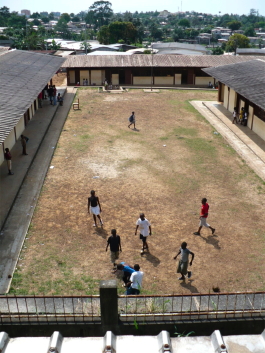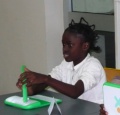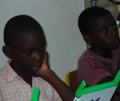OLPCorps LavalUniversity Gabon
Contents
The team
Kaçandre Bourdelais is a Master's student in educational technology at Laval University, Canada. As part of a course taught at the École Normale Supérieure de Libreville (ÉNS), he contributed to the development of an pedagogical guide for the use of the XO laptop.
Doudou Camara is a Ph.D. candidate in educational technology at Laval University. He holds a Master's degree in data processing. He has been teaching computer science for more than ten years. He has an extensive background in the technical aspects of computer networking design.
Brigitte Mavoungou is a Master's student in the Laval University education program offered at ÉNS in Libreville. She is a teaching adviser in Social Studies for secondary schools in Gabon. She also contributed to the development of the pedagogical guide for the use of the XO. It is very important for our team to include a female perspective, since among the 24 teachers at ENS-B primary school 22 are women.
Monéyi Nko Adrien Joseph is a Master's student in the Laval University education program offered at ÉNS in Libreville. He also contributed to the development of the pedagogical guide for the use of the XO. He will be involved in the project follow-up team in October 2009.
The project and its potential impact: children and the community
This project builds on work undertaken in Gabon in fall 2008. Within the framework of an educational community project involving the principal, parents and teachers, it focuses on initiating the integration of the XO in the elementary public school of the École Normale Supérieure (ÉNS-B).
One hundred children in the later stages of their elementary education are at the heart of the project. Through the use of the XO they will have access to a variety of information sources. But beyond the use of the XO as a digital book, we will foster its pedagogical application through learners' interactions central to their appropriation and construction of knowledge (both formal and informal), in particular through and the completion of culture-related projects, so that children play a very active role in the educational situation. Indeed, when this is the case, the school activities become meaningful for the children. The goal is the creation of an authentic collaborative context with an open perspective on the social environment. Also, in keeping with the school mandate and the children's will to succeed, XO integration must take account of the mandatory curriculum. In doing so, a large share of the activities will be developed with the students' ownership of concepts in mind, in preparation for the final exams. However, from a more constructionist perspective, they will be asked to carry out team projects of their choice related to problems affecting their community.
The project team, supported by ÉNS and FSÉ faculty members, will work in concert with teachers to help them plan and implement these instructional activities. Special attention will be paid to help the community buy into the project. For instance, evening activities will be organized so both children and their parents can familiarize themselves with the use of the XO. Children then become real agents of change in the community. In short, the aim is:
•to introduce one hundred children to the use of the XO;
•to help three or four teachers familiarize themselves with the use of the XO in the classroom;
•to help the community buy into the project; and
•to ensure project sustainability.
Location
<googlemap version="0.9" lat="0.425609" lon="9.441526" zoom="17"> 0.425523, 9.442534, École Normale Supérieure de Libreville 0.425394, 9.441236, ÉNS-B Public primary school </googlemap>
Students' availability
Exceptionally, students will be available in June, July and early August due to the three-month Gabonese teachers' strike during the school year. Arrangements have been made so that two school hours will initially be devoted to familiarization with the technical use of the XO on a daily basis. Following that, the XO will be used in the classroom context, with an hour set aside every day for optional activities or small-scale projects. Teachers will be assisted by a project team member in both cases.
Local partners
The ÉNS and the Faculty of Education of Laval University have been collaborating for the last ten years. They are currently working on the implementation of a Master's degree in education within the framework of an institutional project. In this context, professors Thérèse Laferrière and Robert Angoue, as well as Kaçandre Bourdelais, have taught an educational technology course aimed at training resource teachers and developing an instructional guide for the use of the XO. The ÉNS is committed to pursuing the integration process. Moreover, the Faculty of Education and the ÉNS will soon submit a grant request for the extension of the scope of the project to the Organisation Internationale de la Francophonie.
Financing
Aside from the requested contribution of $10,000, financing of the project will be arranged through the participation of the following organizations as per the enclosed budget: ÉNS, Faculty of Education and the Office of International Cooperation (Laval University).
Continuum
The credibility and the feasibility of our project is related to the fact that it is, in part, embedded within the institutional cooperation that was intitated in 1999 between l’École Normale Supérieure de Libreville (ÉNS) and the Faculty of Education of Laval University (FSÉ). Therefore, the expertise within these two institution will support us in our efforts to implement 100 XOs in the primary school of application (ÉNS-B) which is adjacent to the campus of the ÉNS.
Ou intention to implement XOs in that particular school is not a decision that comes out of the blue. Indeed during the month of may 2008 we were asked by the director of the ÉNS to conduct a trial with a small group of seven children and one teacher, after the institution had acquired 10 XOs through the OLPC’s Give one Get one program. This trial was led by two professors of that institution (Robert Angoue and Odette Ntsame) with the help Kaçandre Bourdelais (assistant). It enabled us to document some of the difficulties that the children experienced in their initiation in the use of the XO, but also the promises offered by the XO for this small community of learners as far as knowledge building is concerned. The results of that trial can be consulted here. One of the very stimulating effect that occured during this trial is the transformation of the relation between the children and the teacher. He accepted happily that the children could help him learn something and the smile on is face is an indication that he was not threatened by such a transformation of the usual, rather dogmatic, relation he holds with the children. Changing the context of learning also changed the relations between the different actors.
The second activity on the ÉNS campus was realised in an educational technology course, within the broader context of the master degree in education that the FSÉ (Laval) and the ÉNS are jointly elaborating in the field and not at the drawing table. The activity was conducted by professor Thérèse Laferrière (Laval), professor Rober Angoue and Kaçandre Bourdelais (assistant). It consisted in creating a community of practice dedicated to the production of a pedagogical guide for the use of the XO in the context of a primary school. The students using the XO cooperated in this collective production of a pedagogical document, while experiencing for themselves what it means to learn though their interaction with classmates. Here’s the pedagogical guide. As one can see the three institutions have been collaborating for a certain time and are willing to go on with the project which is an extension of the activites that were inititiated during the last year.





